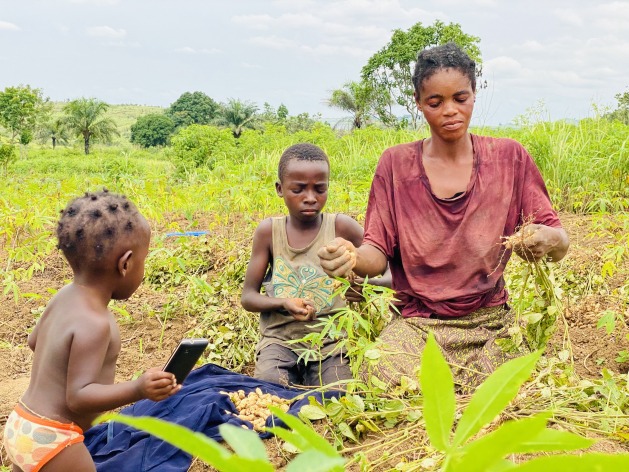ARTICLE AD
 Agathe and her two children cleaning the harvest of groundnuts produced from her 3 hectare plot. Credit: SADC-GMIOpinion by Thokozani Dlamini (pretoria, south africa)Thursday, March 07, 2024Inter Press Service
Agathe and her two children cleaning the harvest of groundnuts produced from her 3 hectare plot. Credit: SADC-GMIOpinion by Thokozani Dlamini (pretoria, south africa)Thursday, March 07, 2024Inter Press ServicePRETORIA, South Africa, Mar 07 (IPS) - International Women's Day 2024 serves not only as a celebration of women's achievements across different sectors but also as a reminder of the persistent obstacles hindering gender equality. In line with the 2024 theme, "Inspire Inclusion," it is imperative for every individual and organization to actively engage in promoting inclusive environments. The adoption of such initiatives fosters safe and respectful spaces where women's contributions are valued and celebrated.
This International Women's Day, we shine a light on Agathe, a 25-year-old smallholder farmer from the outskirts of Kilimwandu, in the Democratic Republic of Congo who was introduced to farming at the tender age of 15.
Agathe epitomizes the diligence and resilience of women who are at the forefront of ensuring regional food security and driving socio-economic transformation.
Smallholder women farmers like Agathe make up an estimated 60-80% of the agricultural labour force in Africa, highlighting the significant reliance on their effort for the continent's sustenance.
It's widely recognized that about 80% of the poorest people in the world live in rural areas, with agriculture being their primary means of livelihood. These farmers, mostly women, sustain their families by cultivating crops and rearing animals on small plots of land.
For millions of women, particularly in rural Southern Africa, Groundwater remains a lifeline, underscoring its importance not just for consumption, but as a critical resource for food production and community stability.
On a recent field visit to Kimpangu, the team from SADC-GMI gained firsthand insights into the pivotal role women play in agriculture and the myriad of challenges they confront, as related by Agathe herself.
Today, we honour Agathe and countless other women like her who are the unsung heroes of the agricultural sector, sustaining economies and nurturing communities with their toil and passion.
Agathe dedicates herself to the three-hectare plot of land entrusted to her by her family, nurturing groundnuts, and diverse crops to support herself and her two young children. “As a devoted mother, my day starts early ensuring that my two children have breakfast and well taken care of, after which I head to my farm. On the field, I invest approximately seven hours each day, toiling to ensure a stable livelihood for my family”, she continued.
Despite her dedication, the income she derives from her small-scale farm is insufficient to afford education expenses, leaving her children’s future uncertain.
“My story is exemplary of the challenges faced by numerous women farmers: I lack ownership of the land I farm, have no direct access to markets to sell my produce, and endure the absence of reliable transportation means” she highlighted as she was narrating her story.
This predicament is compounded by the lack of an alternative water source for irrigation, forcing her to depend solely on natural rainfall, which is increasingly unpredictable. Her resilience in the face of these adversities is a testament to the strength and tenacity of countless women who persist in smallholder agriculture under similar constraints.
Climate change threatens the already erratic rainfall that Agathe relies on, endangering her livelihood and regional food security.
This makes groundwater a more sustainable option for smallholder farmers like Agathe and Southern Africa region. SADC-GMI’s mandate is to promote the conjunctive use and management of surface and groundwater through developing water infrastructure and services, such as wells, and solar pumped irrigation systems.
Supported by the Global Environment Facility (GEF) and the Cooperation in International Waters in Africa (CIWA) through the World Bank, SADC-GMI has been able to and continues to establish community groundwater supply schemes which are contributing to regional food security, access to potable water and climate resilience and adaptation for the vulnerable. Women became an integral part and main beneficiaries of these projects.
Ms. Batanayi Gwangwawa –Environmental and Social Management Specialist for SADC-GMI believes that as a collective we can reinforce the essential role of women by championing sustainable groundwater management, implementing policies and initiatives sensitive to gender needs, and enhancing women's skills in agriculture.
She continues to say that tackling critical barriers, such as secure land ownership, access to finance, comprehensive training, and robust market connections, is fundamental. Such support would not only empower women farmers, increasing their productivity but would also contribute to heightened food security and improved household incomes.
Acknowledging the progress made in women's empowerment is vital. However, it's clear that gender parity, particularly in leadership and decision-making roles, remains an area where further effort is necessary.
In the groundwater sector, for example, the representation of women in decision-making positions is disproportionately low, with only one in five roles occupied by females.
This highlights the ongoing need to promote equal opportunities for women and create systemic changes that enable them to participate fully and equally in sectors that are essential for community development and resource management.
SADC-GMI is steadfast in advancing the implementation of its Gender Equality and Social Inclusion strategy (2021- 2025) , which is built on the fundamental goal of amplifying women's participation across all our projects to maximize impact.
Empowerment of women is not just about equity—it's about enabling them as powerful agents of socio-economic change, critical for the sustainable transformation of our communities.
Thokozani Dlamini is SADC-GMI Communication and Knowledge Management Specialist
© Inter Press Service (2024) — All Rights ReservedOriginal source: Inter Press Service

 9 months ago
30
9 months ago
30 

